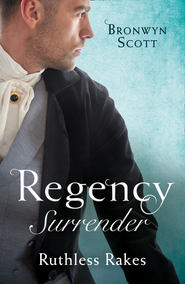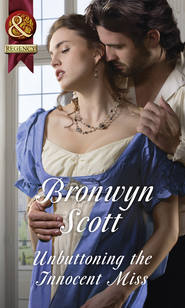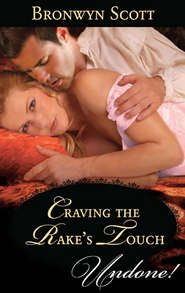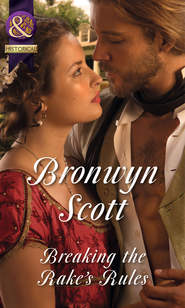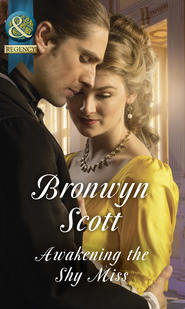По всем вопросам обращайтесь на: info@litportal.ru
(©) 2003-2024.
✖
Bronwyn Scott's Sexy Regency Bundle: Pickpocket Countess / Grayson Prentiss's Seduction / Notorious Rake, Innocent Lady / Libertine Lord, Pickpocket Miss / The Viscount Claims His Bride
Автор
Год написания книги
2018
Настройки чтения
Размер шрифта
Высота строк
Поля
She assigned the boys their tasks, set aside her figure-disguising voluminous cloak and veiling and rolled up the sleeves of her dark blouse. She looked around the room for Stockport, amazed to find him deep in conversation with Mary Malone. He’d discarded his greatcoat and had rolled his own shirtsleeves up. He nodded at something Mary said and leaned over to tuck a thin blanket about her knees.
Nora put a kettle on over the fire to warm the hearty soup she’d brought and set to sweeping. Mary did the best she could, but since her illness, she’d been less able to keep the two rooms clean. All her waning energies were spent on providing food and meals for her three children. By now there had to be very little money left from her husband’s death settlement.
Nora worried what Mary would do when the money ran out. She certainly couldn’t work in her condition. Her oldest son, eleven-year-old Michael, was working at the hat factory, but the two shillings and three pence he brought home weekly would barely be enough for bread, let alone rent or other living supplies.
Nora cast a quick look at Mary’s younger son, Robert. He was six and old enough to work as a scavenger, one of the many children who crawled beneath the machinery at the cotton mills to gather up loose cotton. She shuddered at the thought. The little money he would make doing such a perilous job would not be worth the risk. Each year children died, crushed beneath the heavy machinery if they slipped or were too slow. At best, Robert would end up crippled or permanently stooped from the demands of the job.
Behind her mask, Nora shut her eyes briefly and whispered a prayer. She would find a way to help the Malones. She thought of the three hundred-pound notes she had discovered in Stockport’s breast pocket last night when she undressed for bed. It had been tempting to keep them. It was tempting now to give them to the Malones. Three hundred pounds would be a fortune to them. She fought the temptation. The money wasn’t hers to give and she had given up her right to it when she dared Stockport to come with her today in payment for the ring.
If she took the money, it would confirm all the ills Stockport thought her capable of, and for some reason that rankled. It was inexplicably important that Stockport did not find her lacking.
Nora finished housekeeping and busied herself laying the table. Little Anna came to help put on the cloth Nora had brought, knowing that Mary appreciated such touches of domesticity. Out of the corner of her eye she saw that the boys had discovered Stockport’s greatcoat and Stockport let them. He was even playing with them, using sticks of firewood for swords, looking quite boyish himself.
The sight of him romping with the children was mesmerising. Nora had difficulty tearing her gaze away. His dark hair was uncharacteristically messy and his shirt was coming out of his waistband as a result of his exertions. And Stockport was smiling! Actually smiling the way he’d smiled for the brief moment on the dance floor.
He looked her way and Nora knew she was caught. She must be more careful. Even with her mask on, she felt exposed. He whispered something to the boys and swept her a bow that made the boys laugh before turning back to them.
Nora lit a pair of candles and called everyone to dinner, satisfied that the table, with its cloth and tallow candles, looked well enough to set the day apart from the rest.
The children gathered around the table on barrels and crates serving as makeshift chairs. They looked hungrily at the feast spread before them and Nora tried to see the fare through their eyes. Hattie’s hearty soup with meat and vegetables filled their bowls, while plenty more hung over the fire, drenching the musty room with its rich aroma. Freshly baked loaves of bread sat on a wood board in the centre of the table next to a small crock of butter. The luxury of milk filled their cups.
Stockport escorted Mary to the table and Nora noted how much the young widow leaned on his arm for support. Mary sat and looked around at the expectant faces.
‘Who shall ask the Christmas blessing?’ she asked.
‘Brandon!’ the boys chorused, pointing to Stockport.
Stockport was surprised, but accepted and competently performed the duties. Everyone closed their eyes while Stockport blessed the food and spoke a few words about the sacred day.
Nora stole a look at him while the others had their heads dutifully bent. She should have kept her eyes safely downcast. The moment she gave into the little temptation she knew she was lost. In the candlelight, he looked angelic—like an archangel she’d seen painted in the cathedral in Manchester, a unique mixture of power, strength and justness with his sooty lashes swept over his sapphire eyes and his broad shoulders obvious through the white cotton of his shirt.
He was handsome and he did not disappoint. Today, he’d been all she had anticipated when she’d asked him to accompany her. It would be easier to dislike him if she’d been wrong about him, if he had stayed glued to the seat of her wagon, if he hadn’t carried baskets with her, if he had simply refused to come at all. In all honesty, he’d been better than good. It was more than she’d hoped for.
‘Amen,’ Stockport said solemnly. All heads came up. The children began to eat and exclaim about the food all at once.
Stockport kindly chided them. ‘Eat slowly or it will come back up again.’ Then he launched into a tale from his boyhood about a time when he’d eaten too many apples, making the boys laugh with his gestures and little Anna grin at him with her eyes wide.
He would make a wonderful father. Nora mentally recoiled from the thought it. She was getting positively henwitted if Christmas brought out such a reaction in her. This was the second time she’d had uncomfortably sentimental thoughts regarding Stockport.
He looked down the table at her and winked, bringing her into the new story he was telling. Nora gave herself up to her fantasy, rationalising that it would be her little gift to herself. For the duration of the meal, she pretended she had the right to call him Brandon; that he could call her Nora; she didn’t have to eat dinner with him behind a mask; that they had a supper table filled with children around it who he would make laugh with his tales over the evening meal; two happy people living a simple life in a simple cottage somewhere, with happy children. It had been her ultimate fantasy since she was very young, part of a life she’d once had, but then lost. She took a deep breath and pushed down the memories that thought threatened to dredge up. She couldn’t risk the pain. It made her vulnerable, something she could not afford with the Earl of Stockport hovering so near.
When the meal was over, her daydream was too, firmly locked into its place in the depths of her heart. It was too dangerous to let such a powerful dream linger too long.
After dinner, Stockport roped the children into helping him do the dishes and storing the remaining food, leaving Nora a chance to speak with Mary alone.
‘You’ve done too much. I can’t imagine how you managed all this and I know you’ve brought baskets for so many others,’ Mary said when they were seated near the fire.
‘I’ve done very little.’
‘Everyone will be grateful.’ Mary coughed into a worn handkerchief.
‘How are you, Mary?’ Nora asked cautiously.
‘It is taking me a long time to get over this,’ Mary confessed.
‘Should I send a doctor?’ Nora didn’t know how she’d manage that. She had spent all the money from her robberies on the baskets and rent was due on The Grange. Even if she could find the money, she didn’t know how she’d find a doctor who would be willing to come to such a neighbourhood.
‘This is nothing sunlight and country air can’t cure.’ Mary waved a dismissive hand that looked skeletally thin in the firelight.
Along with hot food, clean living conditions and freedom from worry over an insecure future, Nora mentally added. Out loud she said, ‘I’ll send more food over later this week. The soup and bread should last a few days.’
‘I wish I could say we won’t take your charity, but I have nowhere else to turn and I am grateful,’ Mary said sadly. Mary nodded to Stockport as he sat jiggling Anna on his knee and telling the children a story. ‘Is this man your beau? Does he know who you are? He’s lovely to look at and there’s something in the air between the two of you.’ The thought of love added a soft spark to Mary’s eyes.
Nora shook her head. ‘He’s not my beau. I thought there might be something in it for us if he came today.’ She was saved from saying more when Stockport’s story came to an end and the boys clamoured for presents.
Nora rose and clapped her hands for attention. ‘Gather round over here and Brandon will bring the basket. There might be some presents in there.’ Brandon. The boys had called him by his Christian name and it slipped as easily off her tongue as it had theirs. Perhaps her daydream wasn’t as tightly locked away as she thought. Most likely, it was due to the shirtsleeves’ intimacy of the afternoon.
Brandon placed the basket in front of her and Nora distributed the gifts. There were oranges for the children along with a wooden toy for each of them. For Mary there was a small leather pouch that jingled with coins. Her eyes glistened with tears.
Too soon it was time to leave, but Nora had one more stop to make. Bravely, she hugged the children and made promises to Mary to send more food, wondering all the while how she’d manage it.
Chapter Seven
Stockport watched The Cat make her farewells, the children clinging to her and to him. Anna had him about the legs. He’d had a surprisingly good time with the children. He’d been moved by their delight over the simple fare and gifts. But those had been smaller revelations compared to what he’d learned about The Cat.
His sharp-tongued thief was the very soul of compassion, reaching out with all she had at her disposal. He felt something of a cad to have so verbally doubted her motives. Guilt gnawed at him. He couldn’t help but compare the extravagant and wasteful largesse of the Squire’s ball to the simple surroundings he found himself in today.
The Cat, a common thief, had provided for these people. What had he provided? He had far more at his command and what had he done?
The Cat intrigued him more than ever. He wanted to know who she was. The secret of her identity was creating a feverish mystery he was desperate to solve. But he was no closer to that answer than he’d been last night. She hadn’t trusted him enough to remove her mask all day, although the veiling had come off briefly at Mary Malone’s. As well she might, his conscience reminded him sharply. What would you do if you knew who she was?
It was a valid question, one for which Brandon did not have a ready answer. He should place her under arrest. That had been his plan less than twenty-four hours ago at the Christmas ball. Had his plan succeeded last night, these people would have been denied the happiness she brought today. He thought of the Malone boys delighting in the simple wood toys and Mary Malone’s gratitude for the hot meal. In one fell stroke, he would have taken all that away from them.
It was a sober reckoning to grapple with. When had the villain become the hero? Somewhere between playing swords with the boys and watching The Cat stir Christmas soup over a fire, his priorities had begun to shift. He was no longer as interested in exposing The Cat as he was in protecting her.
Brandon turned to the remarkable woman beside him when Mary Malone’s door finally closed behind them. ‘You’ve given them something special today; something to take into the morning.’ To his disappointment, her veils were back in place.
‘We’ve given them a moment. That is as far as our meagre influence can reach.’ The self-deprecation in her voice stunned Brandon. She believed her efforts were minimal at best.
He offered reassurance. ‘Yet you went and offered that moment anyway. It is more than most people would have done.’
She said nothing and Brandon let the conversation die. Outside, enough rays of daylight were left to see them out of the tenements and back to the wide avenues of affluent Manchester, but the trip home would be conducted in the dark. Not that Brandon was worried. On Christmas night the short road between Manchester and Stockport-on-the-Medlock would be devoid of highwaymen.
They didn’t speak until they reached the wagon and paid the boys who had gathered in shifts to watch the horse. Brandon spoke first in a low, tight voice. ‘Why did you bring me today?’
‘You want to build a mill in bucolic little Stockport-on-the-Medlock. Are you prepared for all this as well?’ The Cat made a sweeping gesture to indicate the slums they drove through. ‘You see how fleeting my efforts are. Mary has her older children and they can barely scrape together enough to pay the rent and buy food.’
Brandon felt duly chastised. He knew children worked in factories. Many mill owners had no scruples when it came to labour. He’d read the reports that came across his desk. Children could be paid less. Before today, he’d never come to face to face with the reality behind the papers. He had seen much of the world, but not that world.







